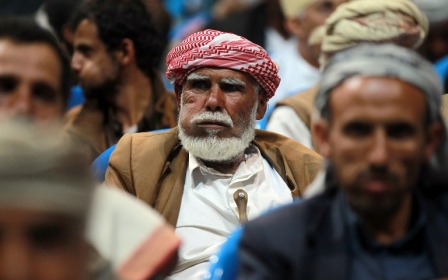Senior al-Qaeda leaders killed in Yemen drone strike

Two senior al-Qaeda officials were killed in a drone strike early Wednesday, Yemeni tribal sources said.
Shawki al-Badani, leader of al-Qaeda in the Arabian Peninsula (AQAP) and Nabil al-Dahab, leader of al-Qaeda-affiliate Ansar al-Sharia, were killed by a drone, along with three other al-Qaeda members in central Yemen.
Badani was listed as a “global terrorist” by the US State Department who say he was linked to at least two bomb plots against the US embassy in Yemen’s capital Sana’a.
A $100,000 reward had originally been offered by the State Department for information on Badani.
The deaths of the senior al-Qaeda leaders come shortly after a drone strike killed twenty other suspected al-Qaeda militants near the central town of Rada, over Monday night.
The town has previously been the sight of intense fighting between AQAP and the Shiite Houthi rebels
AQAP has often been labelled the “most dangerous” al-Qaeda franchise and has been a frequent target of US drone strikes.
The group was originally formed in 2009 as a merger of Yemeni and Saudi al-Qaeda operatives and have voiced support for the Islamic State in Iraq and Syria.
UN to sanction Saleh
Yemen’s former President Ali Abdullah Saleh is set to be hit by UN Security Council sanctions, diplomats said on Tuesday.
A proposal, drafted by the US, would put a visa ban and asset freeze on the former dictator, as well as two of his Shiite Houthi allies, Abdulmalik al-Houthi (after whom the Shiite group is named) and Abdullah Yahya al-Hakim.
The Houthis easily overran Sana'a in September before moving on to Hudeida as well as Shiite-populated Dhamar and neighbouring Ibb.
In a televised speech marking the Shiite festival of Ashura on Tuesday, al-Houthi savaged Yemeni President Abd Rabbuh Mansur Hadi for the failing state of security in the country.
"The problem is not the army's weakness," he said. "[The problem is that] there is no political will [to confront threats to the nation's security]."
He said the death of Yemeni Union of Popular Forces leader Mohammad Abdulmalik al-Mutawakil at the hands of suspected AQAP militants on Sunday was a result of "the president's failure to… wage war on these criminal groups".
US State Department spokeswoman Jen Psaki on Tuesday urged the Yemeni government to “conduct a full investigation that brings to justice those responsible for this crime".
"Yemen's challenges, particularly now, require moderate voices and a commitment to the rapid and peaceful resolution of differences," she added.
She also highlighted the UN’s intention to apply sanctions to people “whose actions risk destabilizing Yemen or threaten the transition process".
Three days after Shiite rebels took hold of Yemen’s capital Sana'a last week, President Abd-Rabbuh Mansur Hadi, accused outside powers of staging an attempted coup.
“I understand that you all feel shocked,” said Hadi in an emotional address to members of parliament gathered in his presidential palace. “You have to know that the conspiracy is beyond any imagination. We were stabbed and we were betrayed from inside Yemen and outside.
“It is a cross-border plot where many forces allied together,” he added.
- See more at: http://www.middleeasteye.net/news/was-uae-behind-houthi-takeover-sanaa-1340168724#sthash.uPojheJm.dpufThe Houthis took over Sana'a in September and began spreading out into central and western Yemen. AQAP regard the Houthis as heretics and the groups have frequently clashed.
Middle East Eye propose une couverture et une analyse indépendantes et incomparables du Moyen-Orient, de l’Afrique du Nord et d’autres régions du monde. Pour en savoir plus sur la reprise de ce contenu et les frais qui s’appliquent, veuillez remplir ce formulaire [en anglais]. Pour en savoir plus sur MEE, cliquez ici [en anglais].




